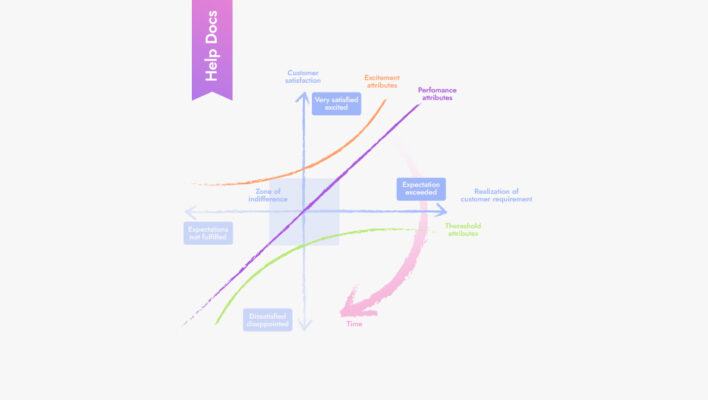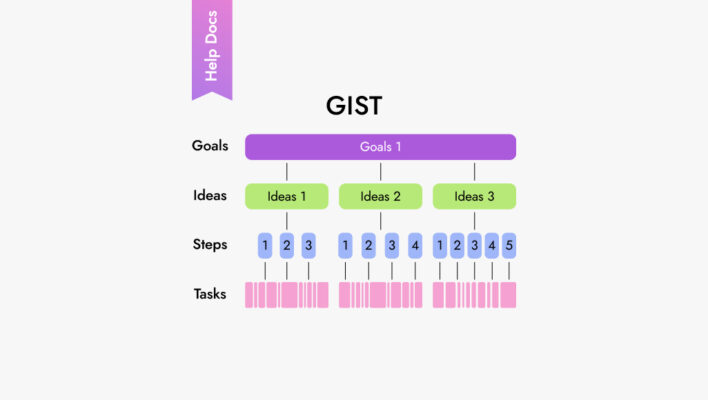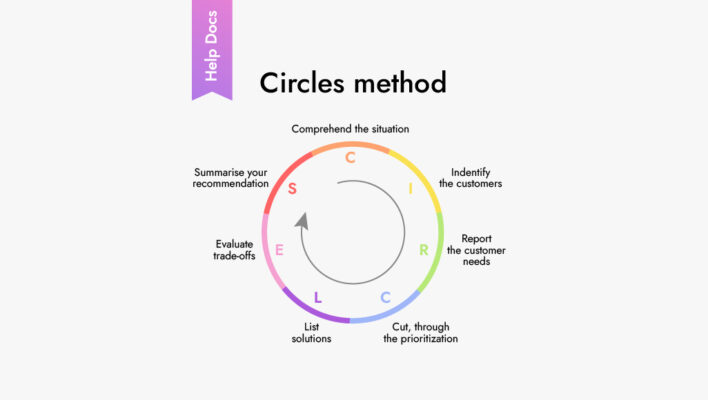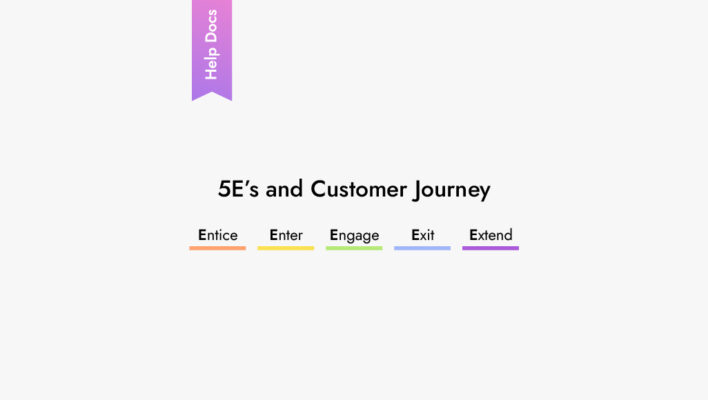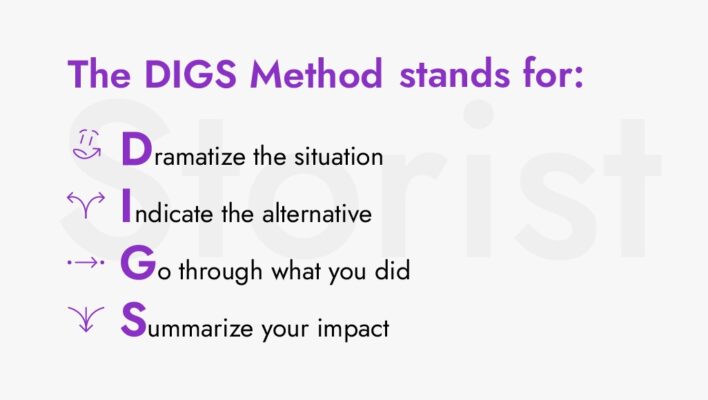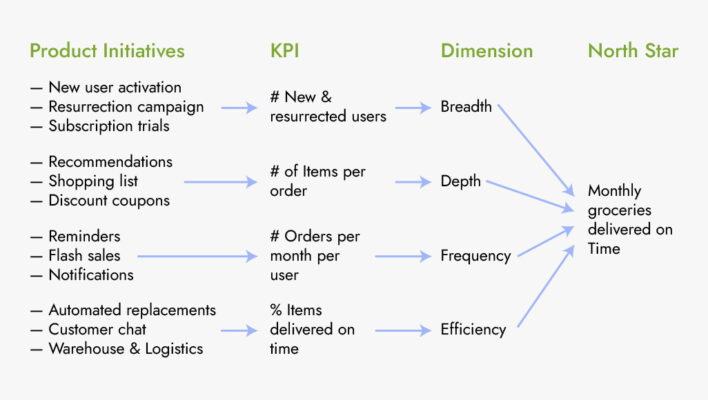7 recommended books for successful career planning
In spring 2022 Forbes published another ranking of the richest people in the world. There are 2668 billionaires on the list and their total estimated wealth is 12.7 trillion dollars. You may be surprised to know that a significant number of those people have come all the way down the same path of professional self-development before making a career. They have read the same books and applied the things they had learned in real life. Why don’t you follow their example? We have picked seven best books to learn business skills that could be found in libraries of all successful people.

Why is it important to read books for making a career?
Scientists have known for some time that books have different influence on our brain opposed to television, for example. Reading books requires focus and mental effort, stimulates imagination and verbal thinking, benefits speech development and expands your vocabulary. As famous speaker, marketing expert and business consultant Dan Kennedy pointed out: “Rich people have big libraries, poor people have big TV’s”.
It is important, however, what you choose to read. Reading “Cinderella” won’t help you in making a career and you will not learn business skills from it. Bestsellers written by successful entrepreneurs are effective, because they tell real life stories and give practical insights. And judging by millions of printed copies as well as a big number of accomplished business men, who had put those books on their shelves, those insights really work.
What books are required in a successful person’s library?
Numerous interviews of accomplished entrepreneurs, including their articles and books, give us the basis to pick at least seven pieces, which had a major influence on those people.
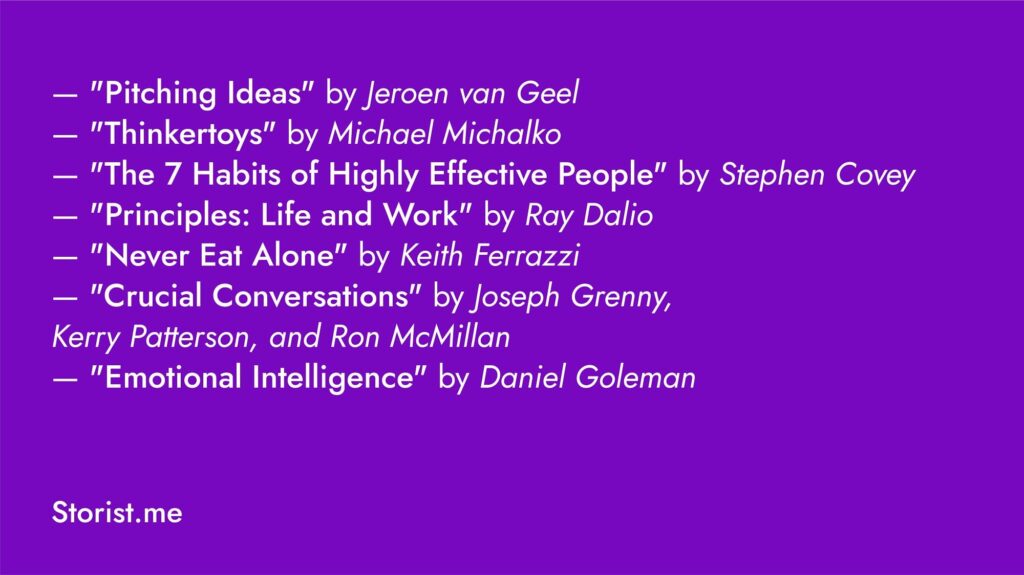
Here is the list:
- “Pitching Ideas” by Jeroen van Geel
- “Thinkertoys” by Michael Michalko
- “The 7 Habits of Highly Effective People” by Stephen Covey
- “Principles: Life and Work” by Ray Dalio
- “Never Eat Alone” by Keith Ferrazzi
- “Crucial Conversations” by Joseph Grenny, Kerry Patterson, and Ron McMillan
- “Emotional Intelligence” by Daniel Goleman
Any business starts with an idea. This thought is developed by Jeroen van Geel in “Pitching Ideas”. He is the creative director of a strategic design studio in the Netherlands, so the graphics in his book are fine. Visual expression is crucial in pitching an idea as he demonstrates it seamlessly.
The author analyzes why some ideas remain simply as a thought in someone’s head and others develop into lucrative projects. Van Geel believes that it is all about pitching: the more interesting cover you will find to wrap your idea around, the more thoroughly you will present it, and thus, the more successful it will become.
According to van Geel, 90% of success is connected with a human factor, not with the quality of an idea. It is crucial to know how to convince the people, who you present your idea to. He gives examples on how to react to questions, attempts to steal your idea, how to show appreciation for feedback and finish the meeting in the right way.
Think outside the box
Find ingenious solutions to seemingly dead-end tasks. “Thinkertoys” by Michael Michalko teaches you this craft. The author has collected and systematized different strategies of creative thinking. This book is filled with puzzles, riddles, charades, which are supposed to ignite your brain and teach you to think outside the box.
Michalko presents interesting techniques and exercises that develop cognitive functioning. He also gives examples of creative breakthroughs in history, which have changed our world.
If you manage to elevate your brain functioning, it will give you an ultimate advantage both in business and in personal life. You will be able to recognize more opportunities, while being provided with the same information as everybody else.
There is no doubt you will make it. Michalko tested his methods on NATO experts and scientists from different countries and contributed to the research of the CIA.

Be effective
Stephen Covey has studied a two-hundred-year baggage of self-help literature. He introduced skills that help to be effective, and described them in his book “The 7 Habits of Highly Effective People”.
In short, these skills look like this:
- Be Proactive
- Begin With the End in Mind
- Put First Things First
- Think Win-Win
- Seek First to Understand, Then to Be Understood
- Synergize
- Sharpen the Saw
- In order to get more, you will have to read the book.
Covey believes that a human being has four areas, which need to be constantly renewed: physical, mental, spiritual and social/emotional. He suggests spending an hour a day working on the first three areas. Do sports, read classics, keep a diary, meditate or pray – all of this will have an impact on your life and work.

Stick to the principles
Ray Dalio, the founder of the biggest hedge fund in the world, introduced the rules of life in a “distilled” way. His book “Principles: Life and Work” is a medley of life hacks, thoroughly picked and sorted out in different topics. There are tips on overcoming difficulties, from straightening out personal relationships to evaluating the consequences of what is going on with the market, as well as real life stories, deconstructed to the bits and analyzed by the meticulous author.
While telling his life-story, he describes the situation on the markets in the 70s and 80s through a financial expert’s perspective. Classic examples are presented in ways that you won’t find in economics books, and accompanied with explanations of the consequences along with the guidelines to follow in terms of investments.

Make useful contacts
Social skills and ability to develop networking is one the major qualities of people, who have built a successful career. This is what “Never Eat Alone” by Keith Ferrazzi is about.

The author is an expert in communication. His notebook is filled with contacts of more than five thousand powerful people of the world. In his book, he shares the secrets of making a career, which was greatly influenced by the development of social networks.
Ferrazzi breaks down step by step how to make contacts with the right people and how to use it in career building.

Learn to negotiate
The better we get understood, the more we can achieve. This is the focal point of the “Crucial Conversations” by Joseph Grenny, Kerry Patterson, and Ron McMillan.
The authors in a brilliant way use the same principles that let Mormon preachers win over thousands of people, in all areas of communication. Their tips could be applied while interacting with a child or with business partners, they will help to convert anger and hurt feelings to mutually beneficial dialogue with a client and negate a quarrel with the spouse. The great thing about this book is that it gives universal patterns of behavior in a dialogue. There are complex examples of applying different approaches in the same situation or a dialogue.

Listen to your emotions
We are driven by emotions, and if you won’t learn to interpret and control them, you won’t be able to negotiate and convince your partners. This is the essence of the “Emotional Intelligence” by Daniel Goleman.
Emotional intellect consists of five characteristics: self-awareness (interpreting your emotions), self-regulation (controlling emotions), self-motivation (directions of your emotions), empathy (reading other people’s emotions) and social skills (how to use other people’s emotions).
Advanced emotional intellect gives huge advantages: more achievements with the same IQ level, the higher level of life satisfaction, better health.
On the one hand, sadly, emotional intellect is defined by genetics, biology and environment. On the other hand, fortunately, it can be developed and elevated. The author gives tips on how to do it.

Instead of conclusion
As you can see, none of these books gives you a direct algorithm of conducting a business. Nevertheless, it teaches you to communicate with people, form the ideas and push them forward, control your emotions and negotiate. The experience of all successful people shows that these skills are utmost important. Knowing the laws of economics will also come in handy.


